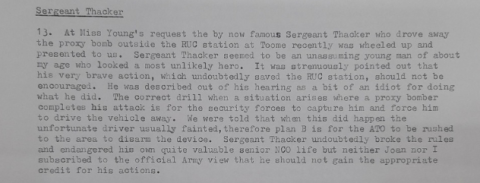An Unorthodox Solution??
A British Response to Proxy Bombs 04 December 2024
This declassified NIO file reveals some disturbingly cavalier attitudes towards civilians on the part of civil servants. It concerns drivers who were forced, usually by the IRA, to drive ‘proxy bombs’ to their targets. This was a deeply controversial and terrifying practice and an egregious breach of the human rights of the unfortunate civilians who were forced to drive an explosive device under duress. In discussing how to tackle this the internal NIO memo suggests that the civilian driver be forced back into the vehicle and made to drive the bomb away from the target. This would clearly be yet a further flagrant breach of the human right to life of said individual worthy of something the IDF would do. Human life really was cheap.

“Note of a visit to the 1st Battalion, The Worcestershire and Sherwood Forresters Regiment: 17 March 1976”. The document opens – “Background 1. Because of what appeared to be a deteriorating security situation in South London Derry (sic) I decided to arrange a trip to the Battalion to make an assessment for myself.”
It was prepared by T J Oyler, Division 1(B) on 19 March 1976
The text reads as follows:
"At Miss Young's request, the by now famous Sgt Thacker who drove away the proxy bomb outside the RUC station at Toome recently, was wheeled up and presented to us. Sergeant Thacker seemed to be an unassuming young man of about my age who looked a most unlikely hero. It was strenuously pointed out that his very brave action, which undoubtedly saved the RUC station should not be encouraged. He was described out of his hearing as a bit of an idiot for doing what he did. The correct drill when a situation arises where a proxy bomber completes his attack is for the security forces to capture him and force him to to drive the vehicle away. We were to told that when this did happen, the unfortunate driver usually fainted, therefore plan B is for the ATO to be rushed to the area to disarm the device. Sergeant Thacker undoubtedly broke the rules and endangered his own quite valuable NCO life but neither Joan nor I subscribed to the official army view that he should not gain the appropriate credit for his actions."
The implied comparison between the value of an Irish life and that of a British NCO embodies the colonial attitude which permeated military policy and decision-making , particularly in the early years of the conflict in the North of Ireland.